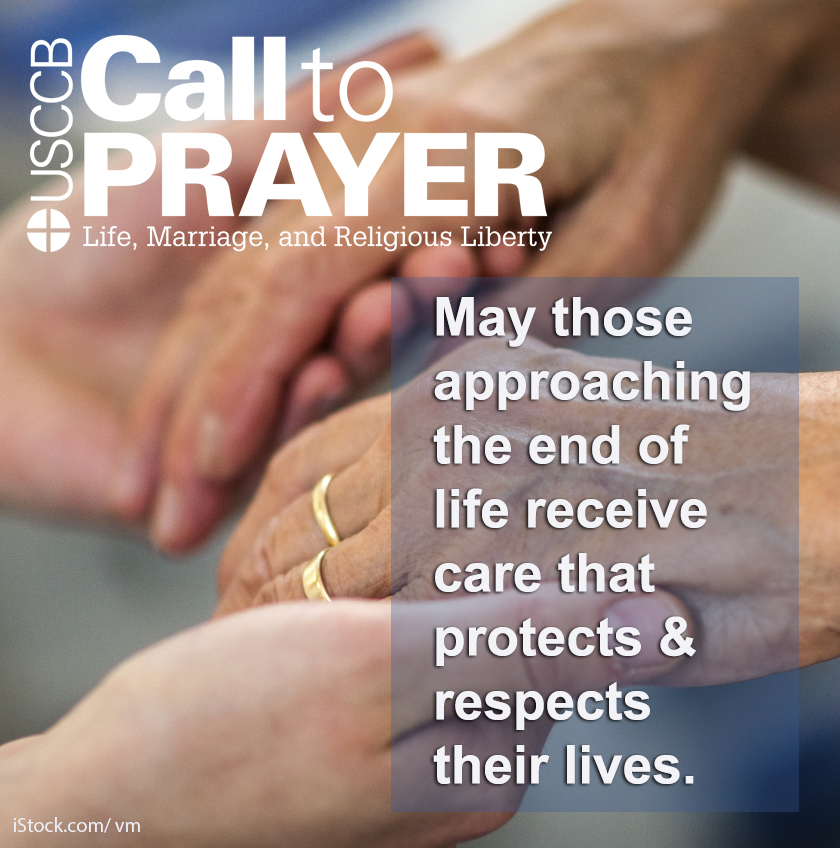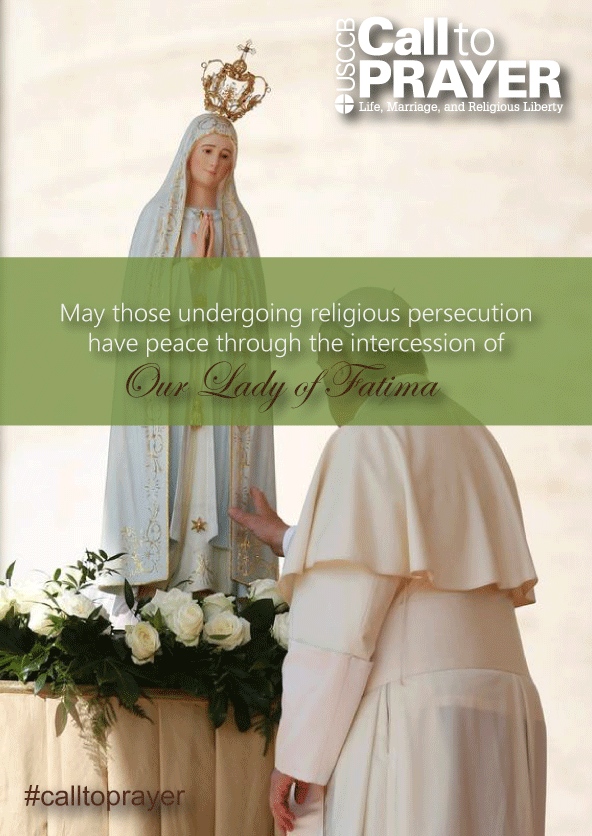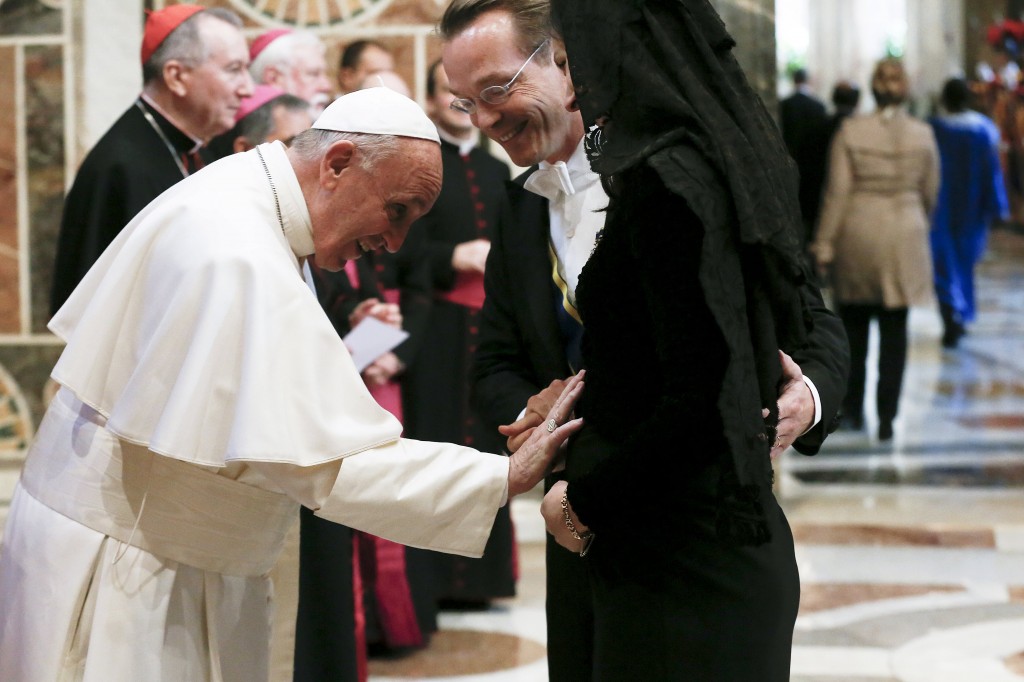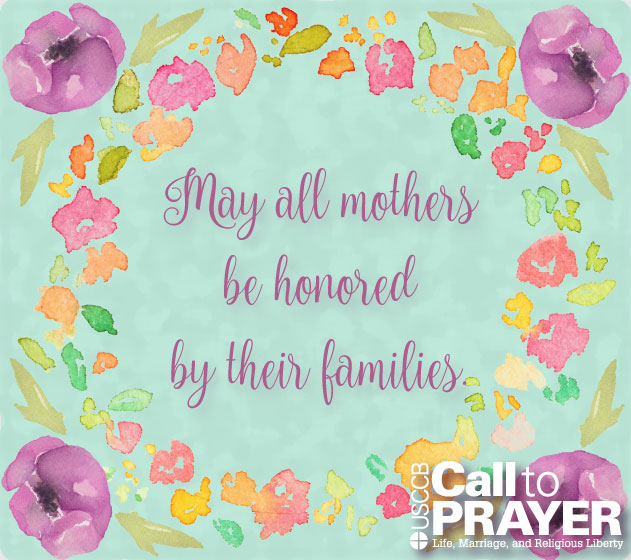Archive
Posted May. 31, 2016 by DOM
May 30
“Love believes all things” (1 Cor 13:7).
Pope Francis: “This trust enables a relationship to be free. It means we do not have to control the other person, to follow their every step lest they escape our grip. Love trusts, it sets free, it does not try to control, possess and dominate everything. This freedom, which fosters independence, an openness to the world around us and to new experiences, can only enrich and expand relationships” (Amoris Laetitia, no. 115).
The erosion of trust in a relationship can happen slowly, but Pope Francis gives us a picture of what it looks like when trust fades: the desire to control the other out of fear. In prayer today, ask for the grace to deepen your trust in your spouse.
May 31
“Love believes all things” (1 Cor 13:7).
Pope Francis: “Those who know that their spouse is always suspicious, judgmental and lacking unconditional love, will tend to keep secrets, conceal their failings and weaknesses, and pretend to be someone other than who they are. On the other hand, a family marked by loving trust, come what may, helps its members to be themselves and spontaneously to reject deceit, falsehood, and lies” (Amoris Laetitia, no. 115).
In a trusting context, one has no need to hide. Children who grow up in this context will know that they will be accepted always, and so will have the courage to own up to shortcomings. Examine your conscience today about whether you’ve fallen into suspicion, unfair judgment, or seeming to withhold your love due to a shortcoming of a family member.
June 1
“Love hopes all things” (1 Cor 13:7).
Pope Francis: “Panta elpízei. Love does not despair of the future. Following upon what has just been said, this phrase speaks of the hope of one who knows that others can change, mature and radiate unexpected beauty and untold potential” (Amoris Laetitia, no. 116).
A common phrase of spouses is, “Oh, he/she will never change.” While it’s not your job to change your spouse, it’s also not true that people do not grow and change over time with the help of God. After all, don’t you? Ask the Lord to increase your hope.
June 2
“Love hopes all things” (1 Cor 13:7).
Pope Francis: “[Hoping all things] does not mean that everything will change in this life. It does involve realizing that, though things may not always turn out as we wish, God may well make crooked lines straight and draw some good from the evil we endure in this world” (Amoris Laetitia, no. 116).
Supernatural hope keeps our eyes on eternity. Today, entrust problems into God’s hands and ask him to “make the crooked straight.”
June 3
“Love hopes all things” (1 Cor 13:7).
Pope Francis: “[In heaven], the person’s true being will shine forth in all its goodness and beauty. This realization helps us, amid the aggravations of this present life, to see each person from a supernatural perspective, in the light of hope, and await the fullness that he or she will receive in the heavenly kingdom, even if it is not yet visible” (Amoris Laetitia, no. 117).
C.S. Lewis wrote that a soul in glory will be so beautiful that we can hardly look at him or her. Pray tonight for all the members of your family to attain to the Kingdom through Christ’s grace.
June 4
“Love endures all things” (1 Cor 13:7).
Pope Francis: “Panta hypoménei. This means that love bears every trial with a positive attitude. It stands firm in hostile surroundings. This ‘endurance’ involves not only the ability to tolerate certain aggravations, but something greater: a constant readiness to confront any challenge. It is a love that never gives up, even in the darkest hour” (Amoris Laetitia, no. 118, emphasis original).
Every family endures hard times. Recall one such hard time with your spouse, and try to see what good God may have drawn out of it, or, if you can’t see that yet, what you hope he will draw out of it.
Archive
Posted May. 26, 2016 by DOM

Archive
Posted May. 25, 2016 by DOM
Check out the newest video in the MUR series on marriage and religious freedom! Please share it and spread the word.

Archive
Posted May. 16, 2016 by DOM
USCCB Chairmen Respond to Administration’s New Guidance Letter on Title IX Application
WASHINGTON—Two Committee chairmen of the U.S. Conference of Catholic Bishops (USCCB) issued the following statement in response to guidance issued May 13 by the U.S. Department of Justice and the U.S. Department of Education entitled “Dear Colleague Letter on Transgender Students”:
The Catholic Church consistently affirms the inherent dignity of each and every human person and advocates for the wellbeing of all people, particularly the most vulnerable. Especially at a young age and in schools, it is important that our children understand the depth of God’s love for them and their intrinsic worth and beauty. Children should always be and feel safe and secure and know they are loved.
The guidance issued May 13 by the U.S. Department of Justice and U.S. Department of Education that treats “a student’s gender identity as the student’s sex” is deeply disturbing. The guidance fails to address a number of important concerns and contradicts a basic understanding of human formation so well expressed by Pope Francis: that “the young need to be helped to accept their own body as it was created” (Amoris Laetitia [AL], no. 285).
Children, youth, and parents in these difficult situations deserve compassion, sensitivity, and respect. All of these can be expressed without infringing on legitimate concerns about privacy and security on the part of the other young students and parents. The federal regulatory guidance issued on May 13 does not even attempt to achieve this balance. It unfortunately does not respect the ongoing political discussion at the state and local levels and in Congress, or the broader cultural discussion, about how best to address these sensitive issues. Rather, the guidance short-circuits those discussions entirely.
As Pope Francis has recently indicated, “‘biological sex and the socio-cultural role of sex (gender) can be distinguished but not separated'” (AL, no. 56, emphasis added). We pray that the government make room for more just and compassionate approaches and policies in this sensitive area, in order to serve the good of all students and parents, as well as the common good. We will be studying the guidance further to understand the full extent of its implications.
The statement was issued by Bishop Richard Malone of Buffalo, chairman of the USCCB Committee on Laity, Marriage, Family Life and Youth; and Archbishop George Lucas, chairman of the USCCB Committee on Catholic Education.
Consultant Dr. Theresa Farnan also wrote an article about this issue for OSV.
Archive
Posted May. 16, 2016 by DOM
May 16
“You hypocrite, remove the wooden beam from your eye first; then you will see clearly to remove the splinter from your brother’s eye” (Mt 7:5).
Pope Francis: “The Gospel tells us to look to the log in our own eye (cf. Mt 7:5). Christians cannot ignore the persistent admonition of God’s word not to nurture anger: ‘Do not be overcome by evil’ (Rm 12:21). ‘Let us not grow weary in doing good’ (Gal 6:9). It is one thing to sense a sudden surge of hostility and another to give into it, letting it take root in our hearts: ‘Be angry but do not sin; do not let the sun go down on your anger’ (Eph 4:26)” (Amoris Laetitia, no. 104).
Meditate on one of these Scripture passages today. Try to repeat it to yourself throughout the day, especially when you are tempted to anger.
May 17
“Be angry but do not sin; do not let the sun go down on your anger” (Eph 4:26).
Pope Francis: “My advice is never to let the day end without making peace in the family. ‘And how am I going to make peace? By getting down on my knees? No! Just by a small gesture, a little something, and harmony within your family will be restored. Just a little caress, no words are necessary. But do not let the day end without making peace in your family’. Our first reaction when we are annoyed should be one of heartfelt blessing, asking God to bless, free and heal that person” (Amoris Laetitia, no. 104).
Tonight, think over your day and your relationships with your family. Figure out if there’s anyone you should apologize to before bed, and do it.
May 18
“Love does not brood over injury” (1 Cor 13:5).
Pope Francis: “Once we allow ill will to take root in our hearts, it leads to deep resentment. The phrase ou logízetai to kakón means that love ‘takes no account of evil’; ‘it is not resentful’. The opposite of resentment is forgiveness, which is rooted in a positive attitude that seeks to understand other people’s weaknesses and to excuse them… Something is wrong when we see every problem as equally serious; in this way, we risk being unduly harsh with the failings of others” (Amoris Laetitia, no. 105).
Today, pay attention to whether you are falling into the trap of making much out of little. As the well-known book holds, “Don’t sweat the small stuff.” Think about your grievances in light of eternity.
May 19
“Father, forgive them, they know not what they do” (Lk 23:34).
Pope Francis: “Today we recognize that being able to forgive others implies the liberating experience of understanding and forgiving ourselves… We need to learn to pray over our past history, to accept ourselves, to learn how to live with our limitations, and even to forgive ourselves, in order to have this same attitude towards others” (Amoris Laetitia, no. 107).
Mother Mary Francis, a Poor Clare, wrote to her sisters once that the quickest way to “kill” charity is to be too hard on yourself. If you hold yourself to an unrealistic standard, you will do the same to others. Accept your own imperfections today with a laugh and a trusting prayer for mercy.
May 20
“Love does not brood over injury” (1 Cor 13:5).
Pope Francis: “All this assumes that we ourselves have had the experience of being forgiven by God, justified by his grace and not by our own merits. We have known a love that is prior to any of our own efforts, a love that constantly opens doors, promotes and encourages. If we accept that God’s love is unconditional, that the Father’s love cannot be bought or sold, then we will become capable of showing boundless love and forgiving others even if they have wronged us” (Amoris Laetitia, no. 108).
When you experience forgiveness, you know what a gift it is and can then extend it to others. God’s love precedes anything that you do. Today, focus on letting your family members see that your love for them is not dependent on their actions.
May 21
“Love rejoices with the truth” (1 Cor 13:6).
Pope Francis: “The expression chaírei epì te adikía has to do with a negativity lurking deep within a person’s heart. It is the toxic attitude of those who rejoice at seeing an injustice done to others. The following phrase expresses its opposite: sygchaírei te aletheía: ‘it rejoices in the right’” (Amoris Laetitia, no. 109).
The idea of being glad at someone else’s misfortune is such a common temptation that there’s actually a word for that in German: schadenfreude. It’s an ugly thing. Today practice “rejoicing in the right” by noticing at least one thing your spouse or child(ren) does and acknowledging it with a heartfelt “thank you”.
Archive
Posted May. 15, 2016 by DOM
 Theresa Farnan, Ph.D. is currently an adjunct member of the philosophy department at Franciscan University of Steubenville and a consultant to the USCCB Committee on Laity, Marriage, Family Life and Youth. Find more of her work on her website.
Theresa Farnan, Ph.D. is currently an adjunct member of the philosophy department at Franciscan University of Steubenville and a consultant to the USCCB Committee on Laity, Marriage, Family Life and Youth. Find more of her work on her website.
With the publication of Amoris Laetitia (AL), Pope Francis offers some timely thoughts on the importance of both mothers and fathers for families. He begins his meditation on “the joy of love experienced by families” (no. 1) by painting a vivid picture of family life. “At the center, we see the father and mother, a couple with their personal story of love. They embody the primordial divine plan clearly spoken of by Christ himself: ‘Have you not read that he who made them from the beginning made them male and female?’ (Mt 19:4)” (no. 9).
Francis reminds us that the “deepest reality” of human couples originates with sexual difference – “it is striking,” he notes, “that the ‘image of God’ here refers to the couple ‘male and female’” (no.10). The fruitful, life-giving love of a man and woman gives rise to the family, a “living reflection” of the “communion of love” that is the Trinity (no. 11).
Throughout Amoris Laetitia, Francis strongly reaffirms the importance of sexual difference as the foundation of marriage, lamenting the “failure to realize that only the exclusive and indissoluble union between a man and a woman has a plenary role to play in society as a stable commitment that bears fruit in new life” (no. 52).
In fact, Francis notes, every child deserves to be loved by both mother and father. “The love of parents is the means by which God our Father shows his own love,” not just individually, through each parent’s love for his or her children, but together, as a couple whose love for each other is the foundation of the family (no. 170). Husband and wife, father and mother, both “cooperate with the love of God the Creator, and are, in a certain sense, his interpreters.” Together “they show their children the maternal and paternal face of God” (no. 172).
Mothers and fathers have different relationships with their children. Pope Francis, in a beautiful tribute to mothers, praises their warmth and their tenderness, their dedication and moral strength, all of which help the child “develop a capacity for intimacy and empathy” (nos. 174-175). Fathers are equally important, mediating between the child and the world, helping the child “to perceive the limits of life, to be open to the challenges of the wider world and to see the need for hard work and strenuous efforts” (no. 175).
Francis laments individualism that sees motherhood as a threat to women’s freedom, and offers men a confused understanding of masculinity that devalues fatherhood, commitment, and responsibility (see nos. 173, 176). At the same time, he rejects a rigid division of roles and responsibilities, reminding us that it is the “clear and well-defined presence of both figures, male and female” that best allows children to flourish (no. 175).
In his discussion of the importance of the presence of mothers and fathers, we can see the unique stamp of Francis’s pastoral theology of accompaniment. The family – founded on the loving union of a man and woman – is the primary school in the art of accompaniment, where a child is loved and learns to love.
Archive
Posted May. 14, 2016 by DOM
I may seem unqualified to write a reflection on motherhood. After all, I’m not (technically) a mother; I don’t have any children. However, this apparent lack does give me a unique insight into the beautiful truth that all women are called to be motherly as a way of living out our unique dignity and vocation as women.
All of us, men and women, have the same fundamental vocation: to love (see St. John Paul II, Familiaris Consortio, no. 11). The way women live out our vocation to love is profoundly shaped by our capacity to welcome and give birth to new life. Recent popes have stressed that this capacity is not just biological but affects us down to the core of our identity as women. Being apt-for-motherhood is inseparable from who we are.
Pope Francis pointed to this truth in his apostolic exhortation Amoris Laetitia: “Motherhood is not a solely biological reality, but is expressed in diverse ways” (no. 178). St. Pope John Paul II gave us ample guidance on what these “diverse ways” of expressing motherhood are. At the heart of motherhood, he said, is “a special openness” to a new child, an “interior readiness” to accept him or her, and “a special communion with the mystery of life” (Mulieris Dignitatem, no. 18). While these characteristics are easy to see in the actual conception and birth of a child, this attitude of openness, welcome, and closeness to the mystery of life can be seen in myriad other ways of living out one’s motherhood, such as a concern for the needy and vulnerable, an attentiveness to other people, and generous service to others (see Mulieris Dignitatem, no. 21; and John Paul II, Letter to Women, nos. 9 and 12).
Put another way, conceiving and giving birth to a child, while praiseworthy in an era that often rejects the gift of life and fails to protect the child in the womb, is still only the threshold of motherhood in all its fullness. Motherhood finds its deepest meaning in a concerted effort to do God’s will, to receive another person fully and to generously seek his or her good. Jesus said, “My mother and my brethren are those who hear the word of God and do it” (Luke 8:21). This motherhood is not always the mother-and-child tableau that first comes to mind. Some of the more “hidden” forms could include a mother who places her beloved child with an adoptive family, seeking the child’s flourishing despite her own aching heart; a mother who says goodbye to several children before others even knew they existed, carrying them always in her heart despite her empty arms; a wife not granted the gift of new life but who pours herself out in the service of her extended family; a godmother who steps up as a motherly presence for her godchild when his parents’ lives get hectic; a woman who notices when a co-worker is struggling and offers to help; and so on. These and so many other ways are how all women can live out their motherhood! And they are ways women, even those not blessed with physical motherhood, can affirm the goodness of each and every person, the gift that each child is (truly a gift; not deserved), and how all are called to welcome life at all its stages.
Bethany Meola is an Assistant Director in the Secretariat for Laity, Marriage, Family Life, and Youth
Archive
Posted May. 12, 2016 by DOM

Archive
Posted May. 8, 2016 by DOM
May 9
“Love is not rude” (1 Cor 13:5).
Pope Francis: “To love is also to be gentle and thoughtful, and this is conveyed by the next word, aschemonéi. It indicates that love is not rude or impolite; it is not harsh. Its actions, words and gestures are pleasing and not abrasive or rigid. Love abhors making others suffer. Courtesy ‘is a school of sensitivity and disinterestedness’ which requires a person ‘to develop his or her mind and feelings, learning how to listen, to speak and, at certain times, to keep quiet’ (Octavio Paz, La llama doble, Barcelona, 1993, 35)” (Amoris Laetitia, no. 99).
It is easy to take things for granted in the family and to drop the “niceties” that we use for “company.” But Pope Francis always reminds us to say, “Please,” “Thank you,” and “May I?” to our family members. Here he’s asking us to be intentional about gentleness. Tonight, at dinner, make a conscious effort to speak with courtesy.
May 10
“Love is not rude” (1 Cor 13:5).
Pope Francis: “Every day, ‘entering into the life of another, even when that person already has a part to play in our life, demands the sensitivity and restraint which can renew trust and respect. Indeed, the deeper love is, the more it calls for respect for the other’s freedom and the ability to wait until the other opens the door to his or her heart’” (Amoris Laetitia, no. 100).
It can be hard to wait for your spouse to open up to you, if you know that there is something on his or her mind. Sometimes when it comes to waiting for big things, it helps if we practice by waiting for small things. Today, if you have a treat in your lunch, save it for after work.
May 11
“Love is not rude” (1 Cor 13:5)
Pope Francis: “To be open to a genuine encounter with others, ‘a kind look’ is essential… [it] helps us to see beyond our own limitations, to be patient and to cooperate with others, despite our differences. Loving kindness builds bonds, cultivates relationships, creates new networks of integration and knits a firm social fabric… In our families, we must learn to imitate Jesus’ own gentleness in our way of speaking to one another” (Amoris Laetitia, no. 100).
It can be very difficult to look kindly at a child who is acting out, or at our spouse when he/she doesn’t hear what you said for the nth time. Today, look at your family members and say to yourself, “Jesus is looking at them right now too.” That can help change the way that you see them.
May 12
“Love does not seek its own interests” (1 Cor 13:5).
Pope Francis: “We have repeatedly said that to love another we must first love ourselves. Paul’s hymn to love, however, states that love ‘does not seek its own interest’, nor ‘seek what is its own’. This same idea is expressed in another text: ‘Let each of you look not only to his own interests, but also to the interests of others’ (Phil 2:4)” (Amoris Laetitia, no. 101).
There is a paradox in the Christian life: the love of self and the love of neighbor are intimately connected. Today, plan to savor a moment “with” yourself at some point – over a cup of coffee or with a good book perhaps.
May 13
“Love does not seek its own interests” (1 Cor 13:5)
Pope Francis: “Saint Thomas Aquinas explains that ‘it is more proper to charity to desire to love than to desire to be loved’; indeed, ‘mothers, who are those who love the most, seek to love more than to be loved’. Consequently, love can transcend and overflow the demands of justice, ‘expecting nothing in return’ (Lk 6:35), and the greatest of loves can lead to ‘laying down one’s life’ for another (cf. Jn 15:13)” (Amoris Laetitia, no. 102).
Recall a particular way in which your own mother sought to love rather than to be loved. If she’s still alive, give her a call today to thank her for that memory. If she has passed away, pray for her. Entrust her to the care of Our Lady of Fatima.
May 14
“Love is not quick-tempered” (1 Cor 13:5).
Pope Francis: “The word [St. Paul] uses next – paroxýnetai – has to do more with an interior indignation provoked by something from without. It refers to a violent reaction within, a hidden irritation that sets us on edge where others are concerned, as if they were troublesome or threatening and thus to be avoided. To nurture such interior hostility helps no one” (Amoris Laetitia, no. 103).
Sometimes we overreact to something that happens in our day because secretly in our hearts we have been brooding over a hurt or a slight that happened earlier. Today, be on guard against that. Acknowledge a hurt sooner rather than later and seek to heal it through the mercy of Jesus.
Archive
Posted May. 7, 2016 by DOM

Pope Francis greets an ambassador and his wife during an audience with the diplomatic corps at the Vatican Jan.11. (CNS photo/Alessandro Bianchi, Reuters) See POPE-DIPLOMATS Jan. 11, 2015.
Happy Mother’s Day from Pope Francis and Amoris Laetitia!
On tenderness:
“Let us consider the moving words of Psalm 131. As in other biblical texts (e.g., Ex 4:22; Is 49:15; Ps 27:10), the union between the Lord and his faithful ones is expressed in terms of parental love. Here we see a delicate and tender intimacy between mother and child: the image is that of a babe sleeping in his mother’s arms after being nursed. As the Hebrew word gamûl suggests, the infant is now fed and clings to his mother, who takes him to her bosom. There is a closeness that is conscious and not simply biological” (no. 28).
On pregnancy and expecting a child:
“Pregnancy is a difficult but wonderful time. A mother joins with God to bring forth the miracle of a new life. Motherhood is the fruit of a ‘particular creative potential of the female body, directed to the conception and birth of a new human being’. Each woman shares in ‘the mystery of creation, which is renewed with each birth’. The Psalmist says: ‘You knit me together in my mother’s womb’ (Ps 139:13). Every child growing within the mother’s womb is part of the eternal loving plan of God the Father: ‘Before I formed you in the womb I knew you, and before you were born I consecrated you’ (Jer 1:5)… A pregnant woman can participate in God’s plan by dreaming of her child. “For nine months every mother and father dreams about their child… You can’t have a family without dreams. Once a family loses the ability to dream, children do not grow, love does not grow, life shrivels up and dies’ (nos. 168-169).
“Expectant mothers need to ask God for the wisdom fully to know their children and to accept them as they are” (no. 170).
“With great affection I urge all future mothers: keep happy and let nothing rob you of the interior joy of motherhood. Your child deserves your happiness. Don’t let fears, worries, other people’s comments or problems lessen your joy at being God’s means of bringing a new life to the world. Prepare yourself for the birth of your child, but without obsessing, and join in Mary’s song of joy: ‘My soul proclaims the greatness of the Lord and my spirit exults in God my Savior, for he has looked with favor on the lowliness of his servant’ (Lk 1:46-48). Try to experience this serene excitement amid all your many concerns, and ask the Lord to preserve your joy, so that you can pass it on to your child” (no. 171).
On a child’s need for a mother:
“We cannot ignore the need that children have for a mother’s presence, especially in the first months of life. Indeed, ‘the woman stands before the man as a mother, the subject of the new human life that is conceived and develops in her, and from her is born into the world’. The weakening of this maternal presence with its feminine qualities poses a grave risk to our world. I certainly value feminism, but one that does not demand uniformity or negate motherhood. For the grandeur of women includes all the rights derived from their inalienable human dignity but also from their feminine genius, which is essential to society. Their specifically feminine abilities – motherhood in particular – also grant duties, because womanhood also entails a specific mission in this world, a mission that society needs to protect and preserve for the good of all” (no. 173).
“A mother who watches over her child with tenderness and compassion helps him or her to grow in confidence and to experience that the world is a good and welcoming place. This helps the child to grow in self-esteem and, in turn, to develop a capacity for intimacy and empathy” (no. 175).
On society’s need for mothers:
“‘Mothers are the strongest antidote to the spread of self-centered individualism… It is they who testify to the beauty of life’. Certainly, ‘a society without mothers would be dehumanized, for mothers are always, even in the worst of times, witnesses to tenderness, dedication and moral strength. Mothers often communicate the deepest meaning of religious practice in the first prayers and acts of devotion that their children learn… Without mothers, not only would there be no new faithful, but the faith itself would lose a good part of its simple and profound warmth… Dear mothers: thank you! Thank you for what you are in your family and for what you give to the Church and the world’. (no. 174).
For more from Pope Francis on motherhood, read his catechesis from January 7, 2015!
Archive
Posted May. 5, 2016 by DOM

Archive
Posted May. 1, 2016 by DOM
 Welcome to week two! Hopefully you used your ‘patience’ and ‘kindness’ muscles well last week.
Welcome to week two! Hopefully you used your ‘patience’ and ‘kindness’ muscles well last week.
May 2
“Love is not jealous” (1 Cor 13:4).
Pope Francis: “Saint Paul goes on to reject as contrary to love an attitude expressed by the verb zelói – to be jealous or envious. This means that love has no room for discomfiture at another person’s good fortune (cf. Acts 7:9; 17:5)” (Amoris Laetitia, no. 95).
Sometimes things just seem so easy for other people. Today, when you are tempted to think that your spouse, children, or another relative just has an easier life than you do, remind yourself of how much God has done for you. Be content and pray for the grace to accept your own situation with a peaceful heart.
May 3
“You shall not covet your neighbor’s house. You shall not covet your neighbor’s wife, his male or female slave, his ox or donkey, or anything that belongs to your neighbor” (Ex 20:17).
Pope Francis: “True love values the other person’s achievements. It does not see him or her as a threat. It frees us from the sour taste of envy. It recognizes that everyone has different gifts and a unique path in life. So it strives to discover its own road to happiness, while allowing others to find theirs” (Amoris Laetitia, no. 95).
It is always difficult not to compare ourselves to other people, but that inevitably leads to sadness. Today, reflect upon the unique path that you have been on so far, and entrust yourself to God in confidence. Plan something fun with your family for next weekend so that you can appreciate your family as a gift.
May 4
“Love is not jealous” (1 Cor 13:4).
Pope Francis: “Love inspires a sincere esteem for every human being and the recognition of his or her own right to happiness. I love this person, and I see him or her with the eyes of God, who gives us everything ‘for our enjoyment’ (1 Tim 6:17). As a result, I feel a deep sense of happiness and peace” (Amoris Laetitia, no. 96).
Today, compliment members of your family, and try to choose something that you may never have said to them before. Think about what it means to see someone with “the eyes of God.”
May 5
“Love is not pompous, it is not inflated” (1 Cor 13:4).
Pope Francis: “The following word, perpereúetai, denotes vainglory, the need to be haughty, pedantic and somewhat pushy. Those who love not only refrain from speaking too much about themselves, but are focused on others; they do not need to be the center of attention. The word that comes next – physioútai – is similar, indicating that love is not arrogant. Literally, it means that we do not become ‘puffed up’ before others. It also points to something more subtle: an obsession with showing off and a loss of a sense of reality. Such people think that, because they are more ‘spiritual’ or ‘wise’, they are more important than they really are” (Amoris Laetitia, no. 97).
Do these words – haughty, pushy, puffed up – ever describe you? Make a concerted effort today to remember that even your good intentions and good deeds are gifts from God.
May 6
“Knowledge inflates with pride, but love builds up” (1 Cor 8:1).
Pope Francis: “Some think that they are important because they are more knowledgeable than others; they want to lord it over them. Yet what really makes us important is a love that understands, shows concern, and embraces the weak” (Amoris Laetitia, no. 97).
Is there a member of your family whom you pay less attention to because they aren’t as “smart” as you are? Reach out to them today with sincere interest in their life.
May 7
“But Jesus summoned them and said, ‘You know that the rulers of the Gentiles lord it over them, and the great ones make their authority over them felt. But it shall not be so among you. Rather, whoever wishes to be great among you shall be your servant; whoever wishes to be first among you shall be your slave’” (Mt 20:25-27).
Pope Francis: “It is important for Christians to show their love by the way they treat family members who are less knowledgeable about the faith, weak or less sure in their convictions… In family life, the logic of domination and competition about who is the most intelligent or powerful destroys love” (Amoris Laetitia, no. 98).
Families are always a “mixed bag” in terms of the practice of the faith. Think about the last time that you were with your extended family. Did you treat people kindly, even if they disagree with you or the Church? (This doesn’t mean watering down your love for your faith.) Are you approachable and gentle in your conversations?






